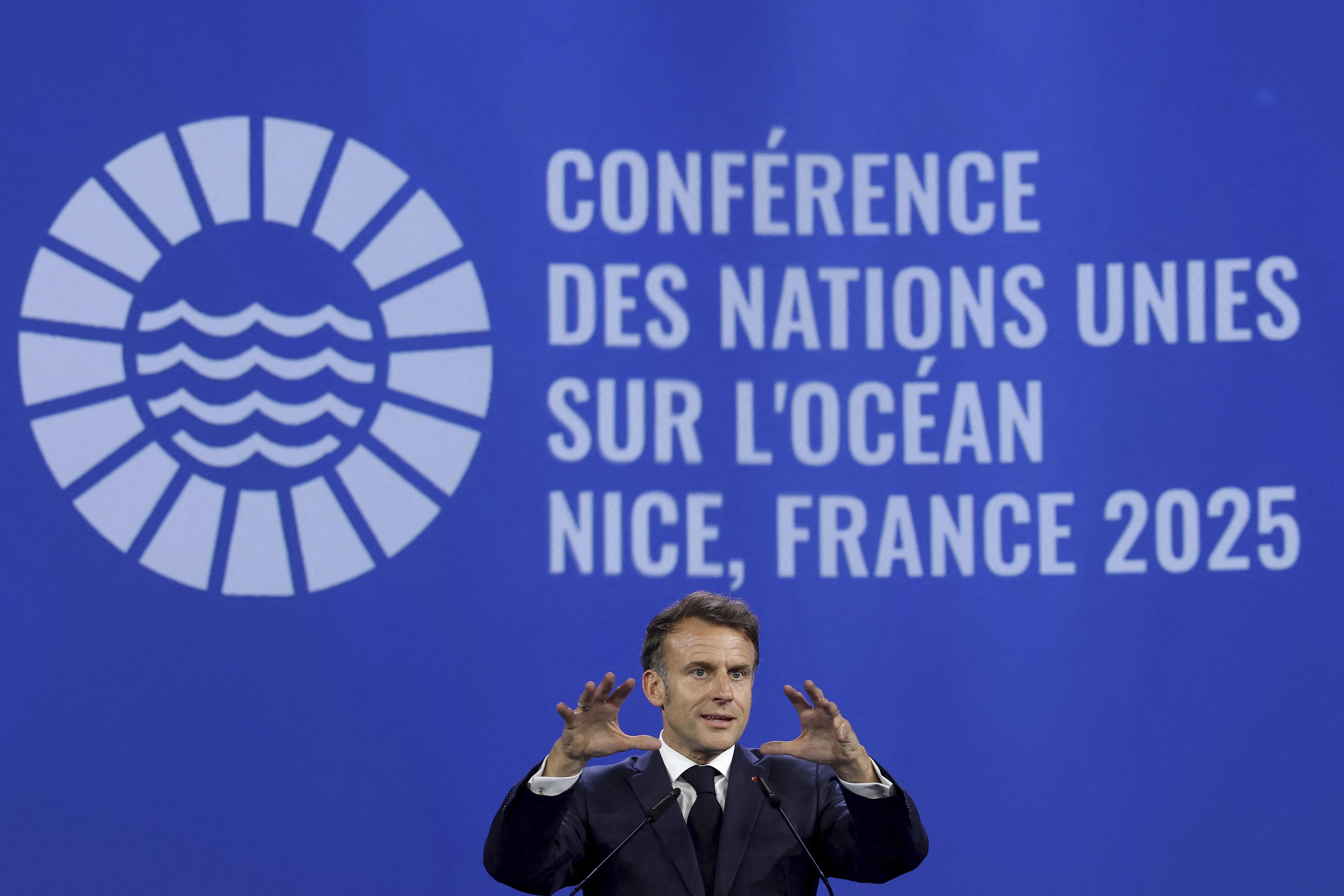Ten years after the turning point in climate change represented by the Paris Agreement, Nice takes the baton and aims to foster a shift in ocean conservation, threatened on all fronts: rising temperatures, water acidification, coastal erosion, ecosystem degradation, plastic pollution, deep-sea mining, among others.
Over 50 heads of state and 180 delegations will convene from tomorrow until Friday in the French Riviera city for the third United Nations Ocean Conference (UNOC3), organized by France and Costa Rica, with Spain playing a key role as the main driver in Europe of the historic High Seas Treaty, which needs ratification by at least 60 countries to come into force (only 29 have done so to date).
"The oceans have become the Wild West," Macron told Nice-Matin upon his arrival by boat to the French Riviera. "Let's hope this summit serves to promote a new global governance and mobilize public opinion." The French president hosted world leaders with a gala reception and dinner at the Negresco hotel, after joining in the World Oceans Day celebrations and announcing measures to limit trawling fishing and expand marine protected areas. Macron expressed regret over "American withdrawal" from multilateral forums and openly criticized Donald Trump's decision to greenlight deep-sea mining in international waters.
The French president will be joined, among others, by Brazil's Lula da Silva and Spain's Pedro Sánchez in their efforts to promote the so-called Nice Action Plan for the Oceans, to be adopted during the summit. The conference was preceded by the One Ocean Science congress, with over 2,000 scientists from a hundred countries emphasizing the importance of the "blue lung" covering 70% of the planet's surface, serving as a major life generator and climate regulator. "The time for speeches and indecision is over: our community calls for listening to science and acting decisively."
The scientific community paved the way for politicians with a ten-point plan to be discussed in the coming days, ranging from the need to better combat overfishing to decarbonizing maritime transport, and the urgency of reaching a global agreement this year on plastic pollution (it is estimated that by 2050, there will be more plastic than fish in the oceans) and addressing ocean warming, acidification, and sea-level rise (by reducing greenhouse gas emissions).
"The goal is to make marine protection a norm, not an exception," warns environmentalist Rémi Parmentier, a legendary crew member of Greenpeace's Rainbow Warrior, who serves as co-facilitator of the Niza UNOC3 (the first two ocean conferences were held in 2017 in New York and in 2022 in Lisbon).
"The Protection Principle goes beyond the precautionary principle and was introduced at the COP15 Biodiversity in Montreal," emphasizes Parmentier, referring to the agreement to protect 30% of the planet by 2030 (30x30). "It is time to recognize that we must protect the ocean because the ocean is protecting us."
"The seas and the life within them do not receive the attention they deserve, let alone the necessary funding," attests biologist and Marilles Foundation director Aniol Esteban, who will be in Nice showcasing the example of the Balearic Islands with their network of 12 marine reserves and more efficient fisheries management (and the first steps towards sustainable tourism).
"There have not been ocean COPs like those held for three decades on climate change, but the Niza conference will be the closest thing," notes Esteban. "We hope it will be a global turning point and could mean a new lease of life for the Mediterranean, a sea and region rich in cultures and biodiversity (11% of the world's marine species in just 0.3% of the volume) warming almost twice as fast as other oceans."
Esteban predicts that in Niza, there could be a qualitative leap towards "strict protection" of 10% of the marine surface (10x30). "We need to create a network of marine sanctuaries, free from fishing, that serve as life refuges and the pantry of the future," emphasizes the Marilles Foundation director, noting how in Spain, strict protection covers less than 0.1% of the marine surface ("it should be multiplied by 100!").
The Mediterranean will have a special focus in Niza, and Spain can seize the opportunity to announce the expansion of its network of marine protected areas (MPAs), currently covering 20.9% of its marine surface. The delegation led by Pedro Sánchez and Minister of Ecological Transition and Demographic Challenge Sara Aagesen has the challenging task of giving the final push to the High Seas Treaty (BBNJ, in English), the first global agreement to protect marine biodiversity in international waters.
Another battleground in Niza will be deep-sea mining, with several countries calling for a moratorium until more scientific evidence on the environmental impacts of activities as disruptive as exploiting sulfides from thermal vents, extracting cobalt-rich crusts on seamounts, or searching for polymetallic nodules on the abyssal plains. Donald Trump has already decided to challenge the International Seabed Authority on his own and sign an executive order authorizing large-scale mineral extraction on the ocean floor, even in international waters.
